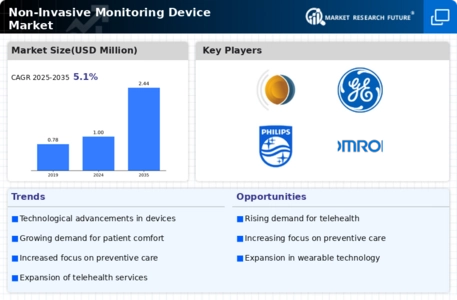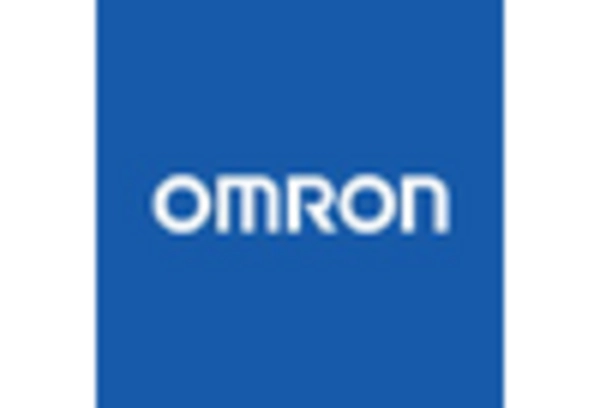Market Share
Non-Invasive Monitoring Device Market Share Analysis
The non-invasive monitoring device market, catering to diverse medical applications, is witnessing rapid advancements. Companies in this sector employ strategic positioning to establish a strong market presence and address the growing demand for non-invasive monitoring solutions. Achieving companies believe sharpening of a differentiated product portfolio is the key to success within the non-invasive monitoring device market. These instruments include measuring blood pressure, sugar level of body, other physiological variables. The extensive range of offered devices, enables companies, to cover the diverse needs of healthcare professionals, which lets them become the one-stop-shop solutions in the field of respiratory care. Market share in this field is achieved on the edge of technology and it is one of the strategic things to be remembered if you want to compete there. Companies undertake the research and development work that enable the use of capabilities like wireless connectivity, artificial intelligence, and remote monitoring to be integrated into their devices. Knowing the move toward remote patient monitoring, the believed companies’ strategies include being the meaning behind the most effective home monitoring solutions. In-home devices which allow patients to self-administer care without resorting to healthcare facilities are examples of non-invasive technology which gives patients a more active role in their health management outside traditional healthcare settings. Collaboration with health systems and institutions is the main rooting which enables to achieve the targeted Market positioning. Organziations make associations with vendors for medical device fabrication which helps to make these devices non-meddlesome and glides them into already existing healthcare infrastructure. The cooperative approach addresses technical issues such as data exchange and software interoperability, which plays a major role in the device’s acceptance among healthcare providers. Data security and privacy become the indispensable components of the era of digital healthcare. Unlike other industries, healthcare sector deals with personal, sensitive data of its customers. That's why it is critical to build trust among healthcare providers and patients to start working with this area. Increasing the usage of non-invasive monitoring devices through their usability associated with market leadership positioning. Companies, employed with simple intuitiveness, scalable user interface, and ergonomical features base their design on users comfort. A device that is user-friendly and readily accessible is the best one. Thus it quickly spread among healthcare workers. Due to the particular nature of non-invasive monitoring technology, the companies which produce it spend money on training workshops to educate healthcare professionals. Familiarization training of medical personnel introduces the elements, benefits, and and best practices of non-invasive monitors sets and essential accessories. The optional technology advisory service therefore helps to prevent underutilization of the devices and enhances the confidence of healthcare professionals.
Companies aiming for a strong market position prioritize clinical validation and evidence-based practice. Conducting robust clinical trials and studies that demonstrate the effectiveness and reliability of non-invasive monitoring devices builds credibility. Healthcare providers and institutions are more likely to adopt devices with a solid evidence base, contributing to market share growth. Offering continuous customer support and regular updates for non-invasive monitoring devices is a customer-centric strategy. Companies that provide timely support, software updates, and maintenance services contribute to customer satisfaction. Satisfied customers are more likely to remain loyal and recommend the company, fostering organic growth and market share expansion.


















Leave a Comment